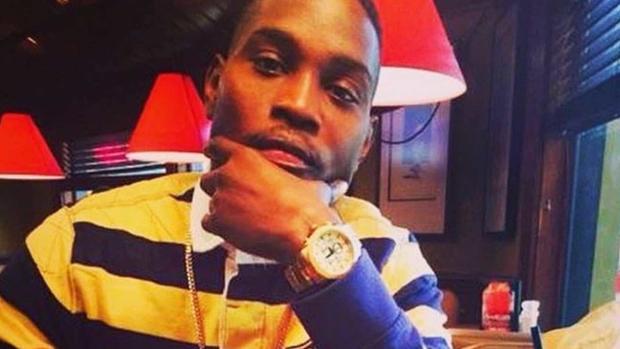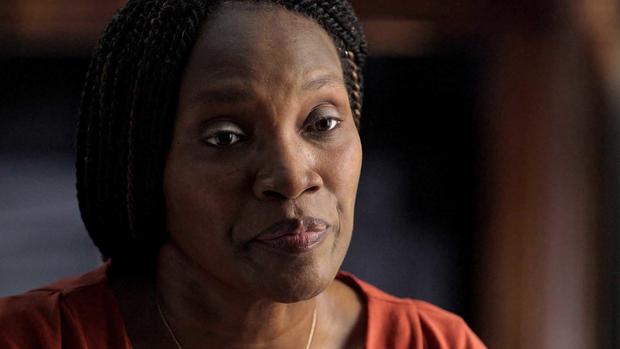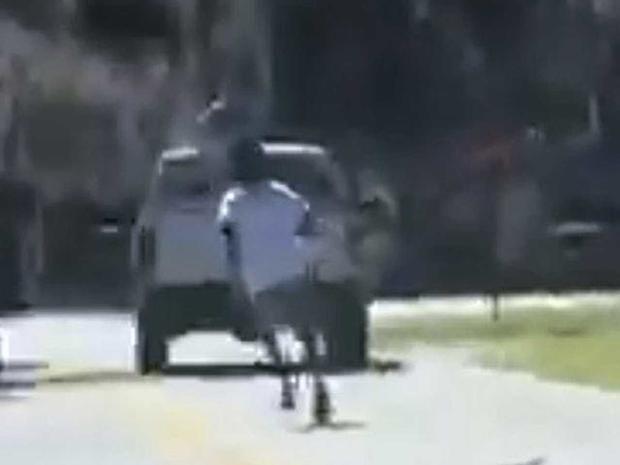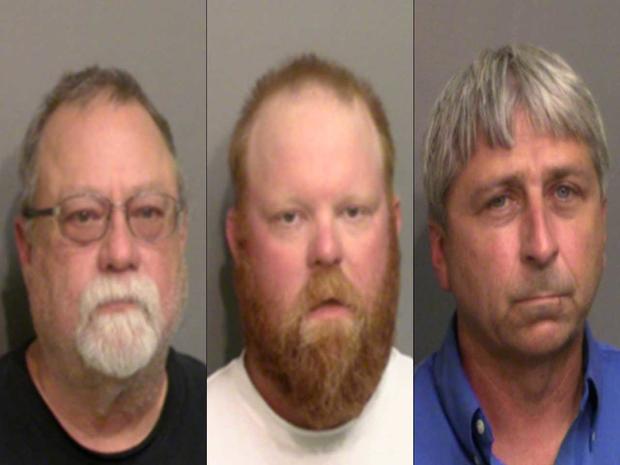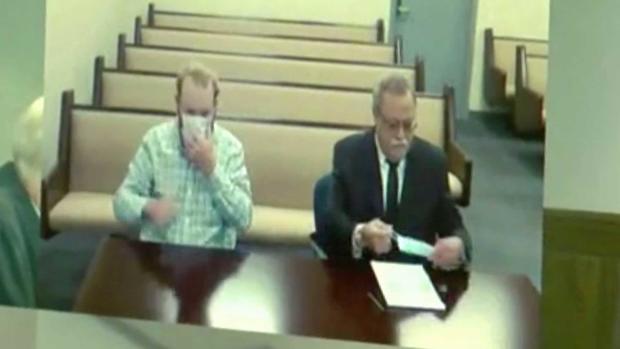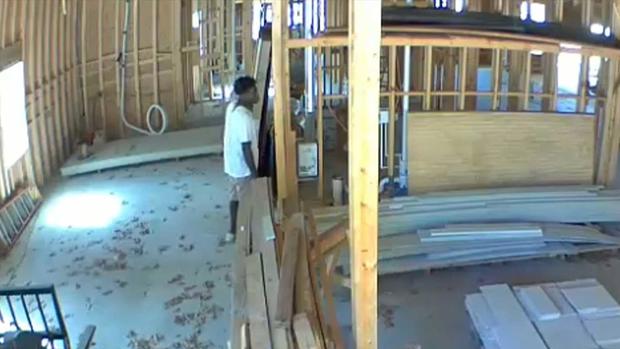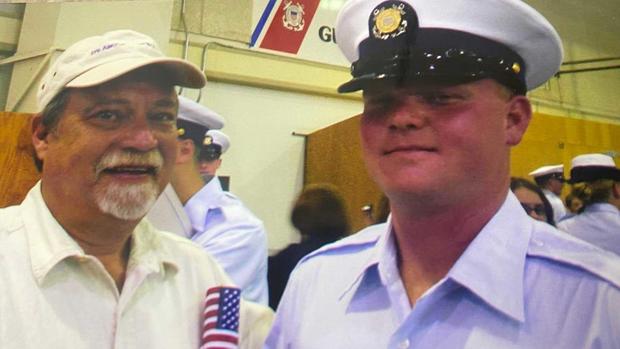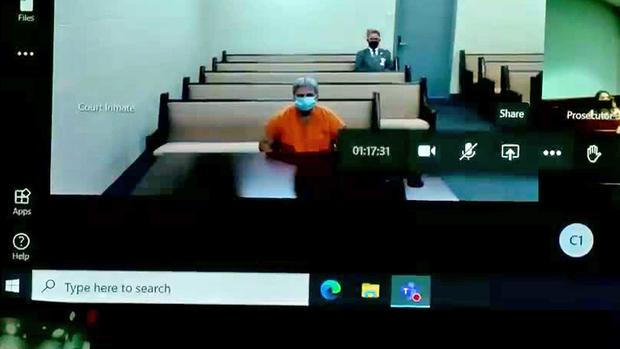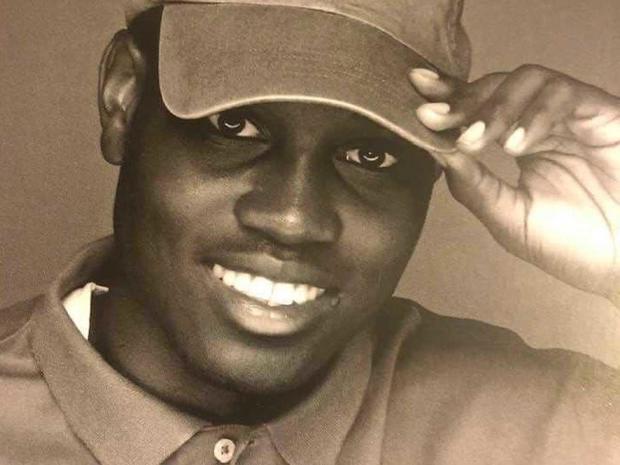Attorneys offer surprising defense for men charged in Ahmaud Arbery killing
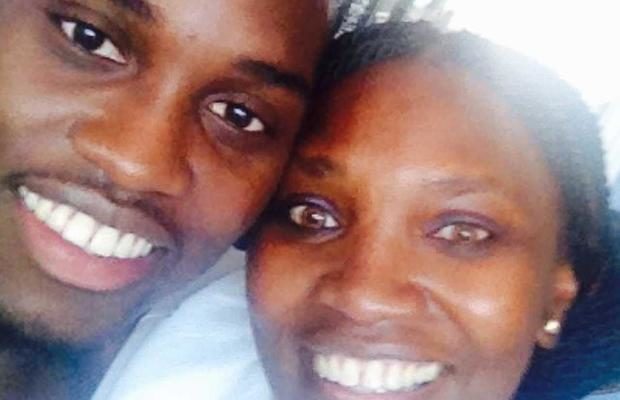
▶ Watch Video: Justice for Ahmaud
Produced by Josh Yager, Rodney Hawkins, Gayane Keshishyan Mendez and Mead Stone
The viral video of Black jogger Ahmaud Arbery being chased and shot dead in Brunswick, Georgia, captured the attention of the nation. Now, as three White men — former law enforcement officer Gregory McMichael, his son Travis and neighbor William “Roddie” Bryan — stand accused of killing Arbery, the prosecutor and the defense attorneys sit down with “48 Hours” and CBS News correspondent Omar Villafranca for their first in-depth network television interviews.
The shooting death of Arbery, 25, is a story about a mother’s relentless pursuit for the truth of what happened to her son. It’s also a case that has raised questions about race and racism, and whether local authorities tried to quash the initial investigation.
IN PURSUIT OF ANSWERS
We know his name because of those last horrifying seconds of Ahmaud Arbery’s life captured on video. But few of us knew him — a young man who was loved by many. His mother, Wanda Cooper-Jones — a woman of quiet strength — made a promise to her son.
Wanda Cooper-Jones: “Don’t worry, son, I promised you the day that I laid you to rest that I will get answers, and I will get justice.”
Omar Villafranca: What do you think he would tell you?
Wanda Cooper-Jones: “Ma, I know you got my back.”
Wanda Cooper-Jones: I haven’t really grasped that Ahmaud is gone forever.
Driving home from work, Wanda says she often passed Ahmaud finishing his daily jog.
Wanda Cooper-Jones: I look for him every time that I’m coming home, and he’s just — he’s not there.
She remembers their last moment together, as she was leaving on a business trip.
Wanda Cooper-Jones: “I’ll be gone for a couple of days, and I love you.” … And his last words to me was, “I love you too.”
Then came the phone call she’ll never forget that Sunday evening last winter, February 23.
Wanda Cooper-Jones: This gentleman identified himself as an investigator from Glynn County Police Department.
She says the investigator told her that Ahmaud had broken into a house and was shot and killed.
Wanda Cooper-Jones How could this happen? Is it real? Is it a bad dream?
Wanda Cooper-Jones: I was young when I had them. We grew up together.
Ahmaud was just 5 years old when his parents split up. Wanda says she worked two jobs while raising him and his older siblings, Marcus Jr. and Jasmine.
Omar Villafranca: How close were you?
Jasmine Arbery: Really close. He knew all my secrets. He defended me when I couldn’t defend myself.
Lifelong friend, Akeem Baker.
Akeem Baker: Ahmaud saw the best in people. He always saw the potential that his friends were capable of.
First love, Shenice Johnson.
Shenice Johnson: He was so handsome, so I was like, “Oh, my gosh.”
Shenice and Ahmaud were just teenagers when they first met. She was working at McDonald’s when she enticed Ahmaud with a frozen dessert.
Shenice Johnson: I made a McFlurry, and he came up and got it. And I did. I got him with a McFlurry [laughs].
They clicked right away, staying together for more than five years.
Shenice Johnson: He always spoke the right words to get me confident and, you know, to not be so nervous.
Shenice was nervous, and a little homesick, during her first year away at college. It was Ahmaud, she says, who encouraged her to stay in school.
Shenice Johnson: That told me a lot about him. Like, he really loves me — for me. … I listened and I got the degree.
Jason Vaughn: Maud was such a leader. Literally, the kids followed Maud.
He showed leadership and grit on the gridiron, says high school football coach Jason Vaughn.
Jason Vaughn: Maud was so easy to love. … And he just had a bright spirit about him.
Wanda says it was after high school when his bright spirit seemed to dim.
Wanda Cooper-Jones: I noticed … he wasn’t as talkative to me.
After a year at a technical college in 2013, Ahmaud lost interest in school, says Jasmine.
Jasmine Arbery: Getting into a low point in life where he had gotten in trouble.
In December 2013, Ahmaud, just 19, was arrested for bringing a gun onto school grounds at Brunswick High. The judge gave him probation.
Wanda Cooper-Jones: Ahmaud was still living in my home … and he has a firearm and I don’t know. So, I’m furious at this moment.
Four years later, in December 2017, Ahmaud was in trouble again — arrested for shoplifting.
His probation was extended, and Wanda was worried. Her son’s behavior, she says, was clearly changing.
Omar Villafranca: Were you worried that his run-ins with the law were going to follow him?
Wanda Cooper-Jones: Very worried. That’s something that I carried every day.
Wanda Cooper-Jones: And I reached out to his probation officer and said, “Hey, I got some concerns. Ahmaud’s not acting right with me. Do you think you could help get him evaluated?”
In December 2018, Ahmaud was diagnosed with schizophrenia. But Jasmine says her brother was never dangerous.
Jasmine Arbery: He didn’t have episodes. He wasn’t violent.
And Ahmaud even came up with his own effective therapy — running.
Wanda Cooper-Jones: He felt like he was in total control when he ran.
Omar Villafranca: Would you notice a difference after he ran?
Wanda Cooper-Jones: Yeah, much calmer. Much calmer.
When Ahmaud made plans to return to school, Wanda felt her son had regained control of his life.
Wanda Cooper-Jones: I never gave up on Ahmaud. Ahmaud was still my baby boy. … We had our challenges, but we were working together to fix those.
But then, his sudden, tragic death.
Jasmine Arbery: I remember falling on the floor. … It was a really big shock — even that he was burglarizing the house. That was a huge shock to me.
Despite Ahmaud’s personal struggles, no one who knew him believed that story.
Jasmine Arbery: And I knew that wasn’t true.
Jason Vaughn: Maud ain’t breaking in any houses. Nah, something’s not right about this.
Wanda Cooper-Jones: I had to get answers to find out exactly what happened.
Wanda says she pushed the police for more details, convinced they were not leveling with her. Shortly after Ahmaud was killed, her suspicions only grew when she picked up the local paper.
Wanda Cooper-Jones: It told us that Ahmaud was actually chased and trapped in and killed in the street.
Chased and killed in the street — not breaking into a home and committing a crime.
Jasmine Arbery: The whole thing of him burglarizing the home was not true.
Soon, Wanda saw their names in the newspaper. The men who were present when her son was shot to death: Gregory McMichael, his son, Travis, and William Roddie Bryan.
Wanda Cooper-Jones: What really stood out was they said that the older McMichael was a retired officer for the sheriff’s office.
Omar Villafranca: That didn’t sit well with you?
Wanda Cooper-Jones: It did not.
Omar Villafranca: So now, Wanda Cooper-Jones has started her investigation?
Wanda Cooper-Jones: Oh yes…
CONFLICT OF INTEREST?
Akeem Baker: It was … middle of the day. Middle of the neighborhood. Middle of the street.
Lee Merritt: The crime here is obvious. There’s a dead man on the side of the road.
First responders arrived within a few minutes of when Ahmaud Arbery died.
Police later questioned and released the three men at the scene: William Roddie Bryan, a 50-year-old local mechanic, Travis McMichael, 34, a Coast Guard veteran, and McMichael’s father Gregory, 64, a retired law enforcement officer.
Omar Villafranca: Why wasn’t anyone arrested immediately? You have a dead man on the floor.
Lee Merritt: And … the victim was black, the suspects were white, and this is South Georgia.
Lee Merritt, a civil rights attorney who represents Ahmaud’s family, believes every bit of this investigation was affected by Ahmaud’s race. And according to investigators, Gregory McMichael quickly made it clear he had friends in high places.
Lee Merritt: He was a close friend of the DA for the county.
The elder McMichael had worked in District Attorney Jackie Johnson’s office.
Omar Villafranca: So, what does that tell a responding officer?
Lee Merritt: That this person is not going to be someone that you can arrest. They are above the law. They are the law.
Ahmaud’s mother Wanda had doubted authorities’ account of the shooting from the very start.
Wanda Cooper-Jones: I had to get answers to find out what exactly happened.
So, Wanda called DA Jackie Johnson’s office. Johnson had already recused herself because Gregory McMichael had worked with her. Johnson’s replacement was a prosecutor from a nearby county, George Barnhill. So, she called Barnhill’s office, too.
Wanda Cooper-Jones: I asked him did he know what happened to my son, I said, “Do you know what happened?” And he said very nonchalantly that Ahmaud was shot more than once with a shotgun.
She says Barnhill told her he was waiting to see if there were drugs and/or alcohol in Ahmaud’s system. The toxicology tests later came back clean.
Wanda Cooper-Jones: He was speaking to me like Ahmaud had did something wrong.
Akeem Baker: The DA’s office was giving her the runaround.
Baker says that’s what Wanda believed when she went online in mid-March to learn for herself everything she could about Barnhill. It was on his Facebook page that she turned up some potentially explosive information.
Wanda Cooper-Jones: There was a Greg McMichael as a friend.
A Facebook friendship between prosecutor George Barnhill and Gregory McMichael.
Lee Merritt: Wanda Cooper-Jones did her homework, found connections.
Merritt says Wanda also discovered Barnhill’s son had a connection to Gregory McMichael. They had both worked together in DA Jackie Johnson’s office.
Wanda Cooper-Jones: So, I knew that all these people were all connected together.
By early April, more than 30 days had passed without an arrest in the Arbery shooting. And people who had known Ahmaud refused to let his death go unanswered.
Jason Vaughn: I’m not gonna let them do it to Maud.
Convinced Ahmaud had been murdered in cold blood, Coach Vaughn and Akeem Baker encouraged the community to apply pressure.
And it apparently had an effect. On April 7, 42 days after the shooting, Barnhill became the second prosecutor to recuse himself from the Arbery case. His written statements at the time could offer a clue about why there had been no arrests.
Lee Merritt: He did — everything that he could — to make Ahmaud Arbery the vicious Black villain that we’ve all been taught to fear.
Pointing to Ahmaud’s two arrests, Barnhill referred to his “apparent aggressive nature,” and argued he was the dangerous one that day.
Lee Merritt [reading Barnhill correspondence]: “This was from the beginning or almost immediately became a fight over the shotgun. … Ahmaud Arbery initiated the fight … Under Georgia law, McMichael was allowed to use deadly force to protect himself.”
Lee Merritt: I’ve seen this movie before … where the victim is made out to be the assailant and the assailants are made out to be the victims.
A week after Barnhill’s recusal, Georgia’s Attorney General appointed DA Tom Durden, from another nearby county, to replace him. But there were still no indictments in the case.
Wanda Cooper-Jones: And I knew, if I didn’t fight, it would not be an arrest.
But then, on May 5, something happened that seared the killing of Ahmaud Arbery into American history:
NORAH O’DONNELL |” CBS Evening News,” May 5, 2020: Tonight, there are explosive new developments in a deadly shooting that’s had racial tensions simmering in a Georgia community.
It turns out, one of the men present at the shooting — Roddie Bryan – had been recording cellphone video. His footage mysteriously appeared online:
NORAH O’DONNELL | “CBS Evening News,” May 5, 2020: Video has surfaced of an African American man being chased down and killed while his family says he was just out jogging. We caution you — this video is graphic.
Shenice Johnson: It made me sick to my stomach.
Akeem Baker: I called my mom crying … I was just hurt.
Jason Vaughn [crying]: It’s one of the most horrifying things I have ever seen in my life.
Wanda says Tom Durden, the third DA assigned to the case, was the first DA to offer his condolences. Durden immediately said he planned to seek indictments and brought in agents from the Georgia Bureau of Investigation. Meanwhile, the outrage quickly spread.
GAYLE KING | “CBS This Morning”: More than 100 people protested in Brunswick, Georgia, last night …
Some famous voices started speaking out too, including Oprah Winfrey, Taylor Swift and Kim Kardashian.
Lee Merritt: We weren’t letting up.
On May 7, 74 days after the shooting, came two arrests.
GBI DIRECTOR VIC REYNOLDS [to reporters]: Agents from the Georgia Bureau of Investigation effectuated an arrest on two individuals, Greg and Travis McMichael.
It was just days after the video went viral. They were charged with both felony murder and aggravated assault.
Days later, another widely shared video of Ahmaud surfaces from 2017. Lee Merritt says it’s another example of racial profiling—the Black man as criminal.
COP to AHMAUD [bodycam video]: What’s your name?
Lee Merritt: He wanted to be alone in the park composing music. That was his goal.
COP [bodycam video]: Got any ID on you, man?
Lee Merritt: And police found him in the park and said he looked suspicious.
COP [bodycam video]: I’m here to look for any kind of criminal activity, that’s all I’m doing.
Lee Merritt: Ahmaud’s understandably agitated by them sort of imputing this criminal element on him.
COP [bodycam video]: I’m not going in your car. Back up!
AHMAUD ARBERY [Standing beside his car]: Don’t touch me, bro!
Lee Merritt: He explains to them, look, you all look around. I’m just here in the park, you know. If you can tell me what I did wrong, I’ll either stop doing it or you can arrest me for it. Otherwise, can I get back to what I was doing?
AHMAUD ARBERY [bodycam video]: Rapping, I rap!
COP: OK.
Another officer arrives and fires a Taser at him. It doesn’t work — and the officers eventually let him go.
COP [bodycam video]: You get what happened here …
COP: You’re good to go, I’m gonna talked to …
Lee Merritt: I kind of cringed as I watched it.
Lee Merritt: You’re supposed to say “Yes, sir, no, sir,” and hopefully survive the encounter.
Ahmaud survived this encounter with police. He did not survive his encounter with three men at Satilla Shores. Two weeks after the McMichaels were arrested, so was Roddie Bryan — and charged with felony murder and criminal attempt to commit false imprisonment.
But by then, the third DA, Tom Durden, had asked his superiors to replace him, saying his office didn’t have enough resources to try the case. Durden would not agree to an interview; neither would the two previous DAs, or anyone in the Glynn County Police Department.
With images of Ahmaud Arbery’s final moments still haunting laptops and living rooms around America, the accused in this case will be heading for court.
Lee Merritt Lee [crying]: I was looking at Wanda, I wanted to make sure that she was OK.
Wanda Cooper-Jones: There’s no words to really describe it.
Lee Merritt [crying]: To know that that’s — that was his last moments — that this evil…
AHMAUD’S FINAL MOMENTS
More than three months after Ahmaud Arbery is killed, Gregory and Travis McMichael appear via video at a preliminary court hearing, where they and William Roddie Bryan face charges for his murder. If the judge rules there’s enough evidence to go to trial, each could face the possibility of a life sentence.
There’s yet another new prosecutor on the case, Jesse Evans, who begins by debriefing the state’s lead investigator agent Richard Dial.
PROSECUTOR JESSE EVANS: Were you able to piece together a chronology of how Ahmaud Arbery came to be shot at Satilla Shores?
AGENT RICHARD DAIL: Yes, sir, I have.
Authorities’ chronology is partly based on Roddie Bryan’s video. So far, Wanda has avoided watching it. But she is in court hoping to learn more about that awful day.
Omar Villafranca: Was that the first time you were hearing details of your son’s final moments?
Wanda Cooper-Jones: Yes, sir.
On February 23, Ahmaud’s time would run out just two miles from the neighborhood he lived in. It happened in Satilla Shores. He’d started his workout before 1 p.m.
Omar Villafranca: Why do you think everybody comes to run here?
Lee Merritt | Arbery attorney [standing in a street in the neighborhood]: I mean, look at it.
Satilla Shores is predominantly White.
Lee Merritt: It was the other side of the tracks. Homes are gorgeous. Beautiful moss-covered trees. You could smell the honeysuckle every time you go into the neighborhood.
Jason Vaughn: For a runner, it is a dream path.
Many of the houses had security cameras, which later helped police piece together what happened.
AGENT RICHARD DIAL: From the surveillance video … you see Mr. Arbery … going directly into the house.
Soon after entering Satilla Shores, Ahmaud stops at a construction site at 220 Satilla Drive, where an out-of-towner is building a home.
Lee Merritt: While he’s inside of the home, one of the neighbors notices.
It’s 1:08 p.m.
AGENT DIAL: He saw Mr. Arbery going into the house so he calls 911.
CALLER: There’s a guy in a house right now, a house under construction.
911 OPERATOR: And you said someone is breaking into it right now?
CALLER: No, it’s all open. It’s under construction.
At the time the house is still missing doors. There are no signs prohibiting entry. Some speculate Ahmaud goes inside for a sip of water — or only to quench his curiosity.
Jason Vaughn: He looks around, kind of admires what was going on, maybe, you know, daydreaming about that one day being his home.
Lee Merritt: He comes out of this front entrance way…
That security footage picks up Ahmaud starting to run again, apparently unaware that he is headed into a world of trouble. The neighbors are still watching.
CALLER: He’s running right now, there he goes right now.
911 OPERATOR: You said it was a male in a black T- shirt?
CALLER: White T-shirt. Black guy, white T-shirt.
And another neighbor has taken a special interest — Gregory McMichael.
The McMichaels would later tell police they’d seen Ahmaud before. And though there is no evidence Ahmaud stole or damaged anything in the house, this day they decide to follow him.
AGENT RICHARD DIAL: Greg McMichael … tells Travis that the guy’s running down the road. They both grab their weapons.
They follow Ahmaud in their truck down Satilla Drive onto Burford Road.
Lee Merritt: The McMichaels are speeding toward him, they get behind him. … They claim that they begin to yell at him, “Hey, pull over, stop, we want to talk to you.” He doesn’t respond.
Omar Villafranca: Why do you think Ahmaud kept running and didn’t stop?
Lee Merritt: So, there were men pursuing him with guns.
The McMichaels are still on Ahmaud’s tail, when he runs past Roddie Bryan’s house. Merritt says Bryan took it upon himself to join in.
Lee Merritt: This is where things really escalate because as he turns around to run the other direction, he’s confronted with another truck.
According to the suspects’ statements to police, they continue chasing Ahmaud through the neighborhood for about the next 4 minutes. Authorities say Ahmaud’s palm print later found around a dent on Roddie Bryan’s truck suggest Bryan had used the truck to hit him.
Lee Merritt: They’re using the trucks to box him in. But he is able to run around them, and at that point he takes off up here…
But Bryan catches up with him again, and now he’s filming with his phone. Meanwhile, investigators say the McMichaels have taken another route to get in front of Ahmaud. They’re waiting for him near the corner of Satilla Drive and Holmes Road. By this point, the father, Gregory McMichael, is in the truck bed with a .357 magnum. At about 1:15 p.m., he calls 911:
GREGORY MCMICHAEL: I’m right here at Satilla Shores. There’s a black male running down the street —
911 OPERATOR: Satilla — where, where, where at Satilla Shores?
GREGORY MCMICHAEL: I don’t know what street we’re on. Stop right there! Damnit! Stop!
McMichael’s son, Travis, is standing near the driver’s door — shotgun in hand.
AGENT RICHARD DIAL: Mr. Arbery … changes direction to go around the passenger side of the vehicle.
When Coach Vaughn watches the video, he says he imagines changing the ending.
Jason Vaughn | Ahmaud’s H.S. football coach: Maud literally tries to do a football move juke and go around. … so, I just kept watching it, like, Maud like, go! Like go Maud, like go!
After Ahmaud changes direction, Travis McMichael meets him by the front bumper.
Lee Merritt: You don’t try to outrun a bullet. He had to engage at that point.
Lee Merritt: He knew he had to fight for his life.
From this point, who did what to whom and why is hotly contested.
AGENT RICHARD DIAL: … you hear a shot.
Lee Merritt: The first shot actually strikes Ahmaud in the chest.
AGENT RICHARD DIAL: They’re engaged in a physical confrontation at this point. They go off the screen.
Lee Merritt: Travis lifts up that gun a second time and shoots him in his hand.
Ahmaud and Travis McMichael quickly come back into view.
AGENT RICHARD DIAL: And then you see a third shot occur.
Lee Merritt: You see Ahmaud stumble and … he collapses.
Ahmaud Arbery is pronounced dead at the scene.
AGENT RICHARD DIAL [at hearing]: The cause was gunshot wound; manner was homicide.
Omar Villafranca: What was your reaction when you’re hearing … from an investigator?
Wanda Cooper-Jones: It gave me a little bit of closure on what happened on that day.
But Wanda says there’s something else about that day she may never understand. Turns out Roddie Bryan gave a copy of his video to the authorities the day Ahmaud died. They have had it all along.
Lee Merritt: The Glynn County Police Department had a chance to see the video before it became public and made no arrests.
Bryan also later tells authorities something else Wanda is still grappling with: that as Ahmaud lies on the ground, Travis McMichael adds insult to injury.
PROSECUTOR JESSE EVANS [at hearing]: Can you please articulate for the court what Mr. Bryan said he heard Travis McMichael say?
AGENT RICHARD DIAL: Yes … Mr. Bryan said that he heard Travis McMichael make the statement, “f*****g n****r!”
Wanda is haunted by the possibility her son was still alive at that moment.
Wanda Cooper-Jones: I became very numb. … I mean it was my baby’s last couple of seconds of his life, and those were the last words he heard?
LEE MERRITT [to reporters]: Racism was the basis of the murder of Ahmaud Arbery.
But defense attorneys disagree.
Jason Sheffield: The video doesn’t tell the story.
THE MCMICHAELS’ DEFENSE
Gregory McMichael’s attorneys Laura and Frank Hogue insist this case is not about race.
Laura Hogue: I don’t believe Gregory McMichael is a racist.
Frank Hogue: It’s not just two White men out there, hunting down, trapping, and executing a Black man, as the prosecution characterized it. … That is not what happened.
They say their client is being unfairly judged by 30 seconds of video.
Frank Hogue: You’re looking through the knothole of a fence. And that’s what you see, is that little piece of video that Roddie Bryan shot.
But, they say, the true testament to his character is his 30-year career in law enforcement.
Laura Hogue: He would jump in and go above and beyond to erase crime.
They say he also jumped in 44 years ago during his early service in the Navy, to save a fellow sailor’s life.
Frank Hogue: Greg paddled out into the surf and was able to get this distressed sailor up onto the surfboard … and got him to the beach. … And the sailor he saved was an African American sailor.
Attorneys Jason Sheffield and Bob Rubin tell a similar story about Travis McMichael.
Bob Rubin: Travis McMichael saved his first life when he was 17 years old … A Black young man fell into the pool and was drowning.
Travis went on to have a long career in the Coast Guard.
Bob Rubin: He saved numerous other lives while serving in the Coast Guard.
Like the Hogues, they also insist this isn’t a case about race.
Bob Rubin: This case is about a good man who had to defend himself on February 23, 2020 — when he was in a terrible situation.
The defense contends the McMichaels were only trying to stop Ahmaud that day because they suspected him of burglary. And they say Gregory McMichael recognized him from a neighbor’s security footage.
Bob Rubin: The only reason the gun came into play is because Ahmaud Arbery attacked Travis McMichael.
According to the police report about the shooting, the McMichaels said they were yelling at Ahmaud to stop running. When Travis pulled over and got out of the truck armed with his weapon, Ahmaud “began to violently attack Travis and the two men then started fighting over the shotgun.”
Bob Rubin: He’s being attacked and overwhelmed by Ahmaud Arbery’s strength. And he has to either fire that gun or lose his life at that point.
Omar Villafranca: That’s gonna be your defense?
Bob Rubin: That’s what happened.
The defense says Travis was afraid of Ahmaud.
Omar Villafranca: Even though Travis has a gun and a vehicle, and Ahmaud Arbery has two legs?
Jason Sheffield: You still can be afraid while you have possession of a firearm.
Cobb County Prosecutor Jesse Evans puts the blame squarely with the McMichaels.
Prosecutor Jesse Evans: Clearly, the person that started this were Greg and Travis McMichael. … When they make the choice that they’re gonna grab guns and take the law into their own hands, that’s when this crime starts. It doesn’t start at the end of this whole progression out in the middle of the street.
At their preliminary hearing, the defense brought up Ahmaud’s mental illness:
JASON SHEFFIELD [at hearing]: Is there anything about the mental history that could’ve played a role that will ultimately go to the question of whether this was a case of self-defense.
Bob Rubin: If it turns out … that those problems can explain why he acted the way he acted, then it might be relevant.
But Evans says Ahmaud’s mental health had nothing to do with the shooting.
Prosecutor Jesse Evans: The defense wants to create a narrative that’s a little bit different than what we all see on the video.
But it seems the McMichaels were so sure they were justified, they’re the ones who arranged to have the video leaked.
Omar Villafranca: Do you believe that this video establishes his innocence
Frank Hogue: Yes, I do. But not just the video … You need more.
Bob Rubin: They don’t know what happened before that day, the week before, the month before that, and the months before that.
And in the months leading up to the shooting, Satilla Shores was on edge.
Bob Rubin: There was a buzz around the neighborhood about all the property crimes that were occurring.
Laura Hogue: Things taken from cars and trucks, trespassing, suspicions of burglary.
Larry English: We was concerned. I had already heard of two or three situations.
Larry English was building a home at 220 Satilla Drive, just down the street from the McMichaels. English had installed security cameras and reported several trespassers on his property.
Larry English: Four, five, maybe six different times.
English’s attorney Elizabeth Graddy says he reported them all.
Elizabeth Graddy: He called when the White couple trespassed. … And even when … children trespass in the daytime.
One of these trespassers is believed to be Ahmaud, who’s seen more than once on English’s security footage.
Prosecutor Jesse Evans: Ahmaud Arbery didn’t commit any crimes in that house. He didn’t take a single thing.
But Ahmaud’s presence at that construction site was causing suspicion among some neighbors.
Lee Merritt: A lot of people began to impute the criminality on the Black person who was coming onto the property.
Two months before the shooting, Larry English received a text from a police officer suggesting he call Greg McMichael if he had any more trespassers. The officer wrote: “Greg is retired Law Enforcement and also a retired investigator from the DA’s office. He said please call him day or night when you get action on your camera.” English never replied to the message.
Lee Merritt: Larry English has made it clear that he did not want and he did not ask for the McMichaels to look over his home for him. … They took it on upon themselves anyway.
Less than two weeks before the McMichaels admit chasing Ahmaud, Travis McMichael had called 911 reporting an intruder at Larry English’s house:
TRAVIS MCMICHAEL [February 11, 2020]: I just caught a guy running into a house being built. Two houses down from me.
911 OPERATOR: What did he look like?
TRAVIS MCMICHAEL: It’s a black male, red shirt white shorts.
Frank Hogue: This is 12 days before the event. So, this neighborhood’s on edge, and the McMichaels are right at the center of it.
According to court testimony from the GBI’s lead investigator, on February 23, Gregory McMichael told police he was operating on a hunch when he decided to go after the Black man they’d seen on English’s property.
FRANK HOGUE [at hearing]: He was trying to intercept someone, he had a thought, a feeling, a gut instinct, I think was Agent Dial’s word.
The McMichaels’ defense says they had every right to pursue Ahmaud.
Bob Rubin: As citizens in the state of Georgia, like many other states … they have … a right to detain others where they have probable cause to believe a crime is being committed.
Prosecutor Jesse Evans: There is absolutely no legal right for a person to stop somebody merely on a hunch or a gut feeling, which is exactly what Greg McMichael said that he had.
Omar Villafranca: Is reasonable suspicion enough?
Prosecutor Jesse Evans: Absolutely not.
Prosecutor Jesse Evans says there’s no justification for any of the choices the suspects made that led to Ahmaud Arbery being shot and killed.
Prosecutor Jesse Evans: Any single shot was too much. Merely pointing that shotgun at somebody was too much. Getting in pickup trucks and chasing Ahmaud Arbery down was too much. This whole case is too much.
And as much as the McMichaels defense insists that race had nothing to do with their actions that day, the prosecution intends to introduce texts and social media evidence to the contrary. In court, the GBI agent noted that material found on Travis’ phone showed him repeatedly using the N-word.
JASON SHEFFIELD [at hearing]: Have you seen any other evidence he used that horrible N-word anywhere else?
AGENT RICHARD DIAL: Yessir, many times.
And then there’s Roddie Bryan’s damning statement that Travis used the N-word standing over Ahmaud’s body. The defense says it never happened.
Omar Villafranca: Do you think Roddie made that up?
Jason Sheffield: I think Roddie Bryan is incredibly motivated … to keep himself from becoming a defendant in a murder trial.
EXPLOSIVE TEXTS
On July 17, William “Roddie” Bryan appears via video at his arraignment hearing.
KEVIN GOUGH: We are prepared to enter plea of not guilty …
JUDGE: Mr. Bryan … is that correct?
WILLIAM “RODDIE” BRYAN: That is correct.
Bryan’s attorney, Kevin Gough, told “48 Hours” his client was minding his own business at home that day when he saw a truck he recognized, chasing a man he didn’t. He got into his truck and began following.
Omar Villafranca: Why did he record it?
Kevin Gough: Why not?
Gough insists Bryan’s actions don’t implicate him in any way.
Kevin Gough: He’s never been more than a witness to this shooting.
Omar Villafranca: Did he call 911?
Kevin Gough: I’m not gonna get into the evidence.
Jesse Evans says Bryan never called 911. And he says there’s plenty of damning evidence about what Bryan did do.
Prosecutor Jesse Evans: We think he’s an active participant.
So active, Evans contends, that in trying to box Ahmaud in, Bryan actually hit him with his truck.
Omar Villafranca: There’s dents on the truck.
Kevin Gough: Well … There is no evidence that Mr. Bryan did anything improper with his vehicle.
Gough goes so far as to claim Ahmaud may have dented the truck while trying to steal it.
Kevin Gough: The state’s gonna have to address … is — is that evidence more consistent with a carjacking or attempted carjacking than Mr. Bryan engaging in any improper conduct.
Omar Villafranca: Kevin, do you think a jury’s gonna buy that?
Kevin Gough: Whoa, whoa, whoa. Whoa, whoa. I’m not the prosecutor.
Prosecutor Jesse Evans: But for the actions of Mr. Bryan — it’s reasonably foreseeable that Ahmaud Arbery could have … exited that — that neighborhood.
But like the McMichaels’ defense, Kevin Gough seems to be counting on the jury to see Ahmaud as the aggressor that day.
Kevin Gough: The simplest explanation for what went on here is that Mr. Arbery charged Travis McMichael.
And Gough insists Roddie Bryan did witness Travis standing over Ahmaud and using a racial slur.
Omar Villafranca: Roddie did hear Travis McMichael say those words?
Kevin Gough: That’s what he told the police … and I’m confident that what he told the police was true.
Omar Villafranca: What about your client? Does Roddie use language like that?
Kevin Gough: I’m sorry?
Omar Villafranca: Is Roddie Bryan a racist?
Kevin Gough: I think he’s not. … Roddie Bryan doesn’t have a hateful bone in his body.
But investigators found Bryan’s phone full of racist texts.
Omar Villafranca: It’s not just once or twice. Again, on Martin Luther King Day, he says, “I bet y’all are having a Monkey parade over there.” Wouldn’t this … paint him that he is a racist?
Kevin Gough: I don’t think so.
Omar Villafranca: I’ve got multiple pages of him using the N-word. And that doesn’t make him a racist?
Kevin Gough: No, sir.
Gough says the texts are being taken out of context.
Omar Villafranca: Do you use that word? I mean, feel free to use it on national TV right now, Kevin. If you think, “Eh, it can be put— it can be used in a proper context.”
Kevin Gough: It’s not a word I would use. But I’m not Roddie Bryan.
Omar Villafranca: Was it a hate crime in your mind?
Jason Vaughn: Absolutely, without a doubt.
Lee Merritt: if it wasn’t for … the complexion of his skin, he would still be alive today.
And to Ahmaud’s family and friends, his name belongs on a list that’s already far too long.
Jason Vaughn: Trayvon Martin, Eric Garner…
Shenice Johnson: Mike Brown …
Akeem Baker: Kendrick Johnson …
Lee Merritt: Breonna, George, and so many other names.
Still, Wanda is determined.
Wanda Cooper-Jones: Some good will come out of this eventually.
Akeem Baker: This is a marathon. It’s not a sprint
And Ahmaud’s lifelong friend Akeem Baker says the road to racial justice may be long, but it’s not a dead end.
Akeem Baker: So, I continue to run … until we get justice for Ahmaud Arbery … I love you bro.
The Department of Justice is considering federal hate crime charges in the Ahmaud Arbery case.

